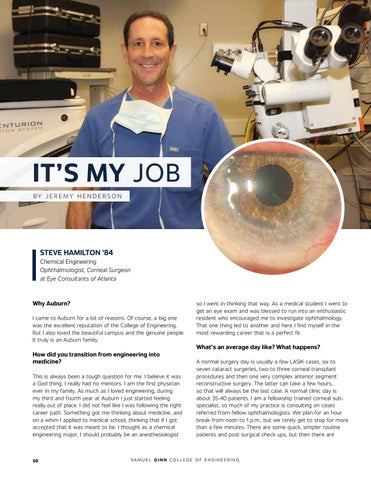IT’S MY JOB BY JEREMY HENDERSON
STEVE HAMILTON ’84 Chemical Engineering Ophthalmologist, Corneal Surgeon at Eye Consultants of Atlanta
Why Auburn? I came to Auburn for a lot of reasons. Of course, a big one was the excellent reputation of the College of Engineering. But I also loved the beautiful campus and the genuine people. It truly is an Auburn family.
How did you transition from engineering into medicine? This is always been a tough question for me. I believe it was a God thing. I really had no mentors. I am the first physician ever in my family. As much as I loved engineering, during my third and fourth year at Auburn I just started feeling really out of place. I did not feel like I was following the right career path. Something got me thinking about medicine, and on a whim I applied to medical school, thinking that if I got accepted that it was meant to be. I thought as a chemical engineering major, I should probably be an anesthesiologist
50
so I went in thinking that way. As a medical student I went to get an eye exam and was blessed to run into an enthusiastic resident who encouraged me to investigate ophthalmology. That one thing led to another and here I find myself in the most rewarding career that is a perfect fit.
What’s an average day like? What happens? A normal surgery day is usually a few LASIK cases, six to seven cataract surgeries, two to three corneal transplant procedures and then one very complex anterior segment reconstructive surgery. The latter can take a few hours, so that will always be the last case. A normal clinic day is about 35-40 patients. I am a fellowship trained corneal subspecialist, so much of my practice is consulting on cases referred from fellow ophthalmologists. We plan for an hour break from noon to 1 p.m., but we rarely get to stop for more than a few minutes. There are some quick, simpler routine patients and post surgical check ups, but then there are
SAMUEL GINN COLLEGE OF ENGINEERING




